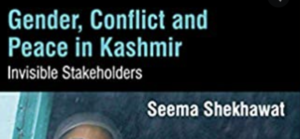Borders :: Female Combatants :: Women, Peace, and Security
Violence against women has been, and continues to be, the motivating puzzle for my research agenda. I was born into a traditional and patriarchal society, where there was significant informal if not formal sanction of violence against women. From my childhood, I have been interested in understanding, redressing, and reforming these dynamics, in my neighborhood and around the world. As an adult, I came to realize that the best path to achieve these goals is through research: trying to figure out how violence and patriarchy are linked, and what it means for societies and states.
My doctoral research focused on the physical, psychological, and sociocultural violence confronted by displaced women, looking particularly at the unique constellation of structural and personal circumstances that frame the experiences of displaced women in Kashmir. It revealed physical and psychological consequences not often understood within the realm of ‘violence against women and its impacts’ (such as depression, anxiety, insomnia, early menopause, and abortion) as key parts of the structural violence that displaced women experienced, and showed the ways that these hardships are amplified in camp settings which claim to ‘protect’ victimized women.
Since then, my research has developed in three strands: looking at (forced) migration, separated families and the gendering of borders; reading the relationships between gender, conflict, and peace through the lives and experiences of female combatants; and engaging the Women, Peace, and Security (WPS) agenda.
I bring to these research projects a wide variety of skills and experiences. In addition to having completed extensive fieldwork in India, Nepal, and Sri Lanka over thirteen years, I have served in a research capacity in Universities and in policy organizations both across the political spectrum and across the world. From professional policy research to scholarly monographs, my research experiences have positioned me well to influence, and continue to engage, both academic and policy conversations. I add to this substantive breadth significant methodological expertise, including more than a decade of ethnographic research, and research experience in conflict zones. Like my previous research work, I expect the next phase of my research agenda to cross disciplinary and academic/policy lines, continuing to explore and combat violence against women.
